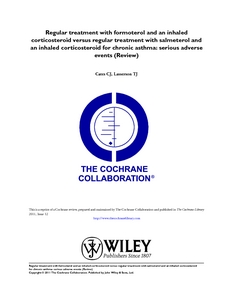Cates, CJ; Lasserson, TJ
(2010)
Regular treatment with formoterol and an inhaled corticosteroid versus regular treatment with salmeterol and an inhaled corticosteroid for chronic asthma: serious adverse events.
COCHRANE DATABASE OF SYSTEMATIC REVIEWS (1).
pp. 1-51.
ISSN 1469-493X
https://doi.org/10.1002/14651858.CD007694.pub2
SGUL Authors: Cates, Christopher Joseph
![[img]](https://openaccess.sgul.ac.uk/2689/1.hassmallThumbnailVersion/CD007694.pdf)  Preview |
|
["document_typename_application/pdf; charset=binary" not defined]
Published Version
Download (684kB)
| Preview
|
Abstract
Background
An increase in serious adverse events with both regular formoterol and regular salmeterol in chronic asthma has been demonstrated in comparison with placebo in previous Cochrane reviews. This increase was significant in trials that did not randomise participants to an inhaled corticosteroid, but less certain in the smaller numbers of participants in trials that included an inhaled corticosteroid in the randomised treatment regimen.
Objectives
We set out to compare the risks of mortality and non-fatal serious adverse events in trials which have randomised patients with chronic asthma to regular formoterol versus regular salmeterol, when each are used with an inhaled corticosteroid as part of the randomised treatment.Search strategyTrials were identified using the Cochrane Airways Group Specialised Register of trials. Manufacturers' web sites of clinical trial registers were checked for unpublished trial data and Food and Drug Administration (FDA) submissions in relation to formoterol and salmeterol were also checked. The date of the most recent search was July 2009.
Selection criteria
Controlled clinical trials with a parallel design, recruiting patients of any age and severity of asthma were included if they randomised patients to treatment with regular formoterol versus regular salmeterol (each with a randomised inhaled corticosteroid), and were of at least 12 weeks duration.
Data collection and analysis
Two authors independently selected trials for inclusion in the review and extracted outcome data. Unpublished data on mortality and serious adverse events were sought from the sponsors and authors.
Main results
Eight studies met the eligibility criteria of the review recruiting 6,163 adults and adolescents. There were seven studies (involving 5,935 adults and adolescents) comparing formoterol and budesonide to salmeterol and fluticasone. All but one study administered the products as a combined inhaler, and most used formoterol 50 mcg and budesonide 400 mcg twice daily versus salmeterol 50 mcg and fluticasone 250 mcg twice daily. There were two deaths overall (one on each combination) and neither were thought to be related to asthma.There was no significant difference between treatment groups for non-fatal serious adverse events, either all-cause (Peto OR 1.14; 95% CI 0.82 to 1.59, I(2) = 26%) or asthma-related (Peto OR 0.69; 95% CI 0.37 to 1.26, I(2) = 33%). Over 23 weeks the rates for all-cause serious adverse events were 2.6% on formoterol and budesonide and 2.3% on salmeterol and fluticasone, and for asthma-related serious adverse events, 0.6% and 0.8% respectively.There was one study (228 adults) comparing formoterol and beclomethasone to salmeterol and fluticasone, but there were no deaths or hospital admissions.No studies were found in children.
Authors' conclusions
The seven identified studies in adults did not show any significant difference in safety between formoterol and budesonide in comparison with salmeterol and fluticasone. Asthma-related serious adverse events were rare, and there were no reported asthma-related deaths. There was a single small study comparing formoterol and beclomethasone to salmeterol and fluticasone in adults, but no serious adverse events occurred in this study. No studies were found in children.Overall there is insufficient evidence to decide whether regular formoterol and budesonide or beclomethasone have equivalent or different safety profiles from salmeterol and fluticasone.
| Item Type: |
Article
|
| Additional Information: |
This review is published as a Cochrane Review in the Cochrane Database of Systematic Reviews 2010, Issue 9. Cochrane Reviews are regularly updated as new evidence emerges and in response to comments and criticisms, and the Cochrane Database of Systematic Reviews should be consulted for the most recent version of the Review. Cates CJ, Lasserson TJ. Regular treatment with formoterol and an inhaled corticosteroid versus regular treatment with salmeterol and an inhaled corticosteroid for chronic asthma: serious adverse events. Cochrane Database of Systematic Reviews 2010, Issue 1. Art. No.: CD007694. DOI: 10.1002/14651858.CD007694.pub2. |
| Keywords: |
Administration, Inhalation, Adolescent, Adult, Albuterol, Androstadienes, Anti-Asthmatic Agents, Asthma, Budesonide, Drug Therapy, Combination, Ethanolamines, Glucocorticoids, Humans, Randomized Controlled Trials as Topic, Science & Technology, Life Sciences & Biomedicine, Medicine, General & Internal, General & Internal Medicine, METERED-DOSE INHALER, SALMETEROL/FLUTICASONE PROPIONATE, PERSISTENT ASTHMA, BUDESONIDE/FORMOTEROL MAINTENANCE, COST-EFFECTIVENESS, RELIEVER THERAPY, COMBINATION, MODERATE, EXACERBATIONS, MANAGEMENT |
| SGUL Research Institute / Research Centre: |
Academic Structure > Population Health Research Institute (INPH) |
| Journal or Publication Title: |
COCHRANE DATABASE OF SYSTEMATIC REVIEWS |
| ISSN: |
1469-493X |
| Related URLs: |
|
| Web of Science ID: |
WOS:000274653900039 |
| Dates: |
| Date |
Event |
| 2010-01-20 |
Published |
|
| URI: |
https://openaccess.sgul.ac.uk/id/eprint/2689 |
| Publisher's version: |
https://doi.org/10.1002/14651858.CD007694.pub2 |
Statistics
Item downloaded times since 12 Dec 2012.
Actions (login required)
 |
Edit Item |


